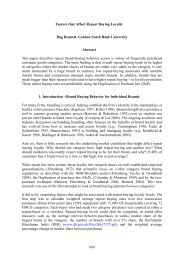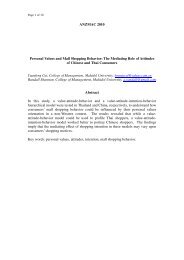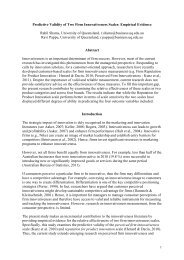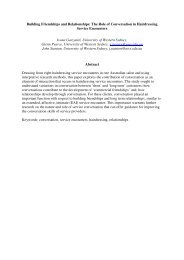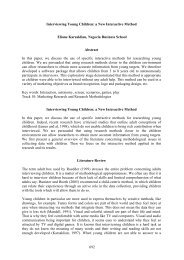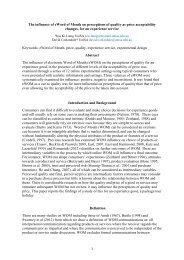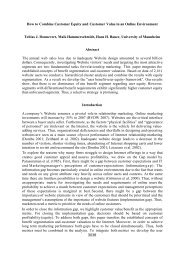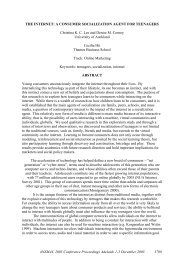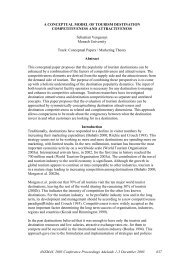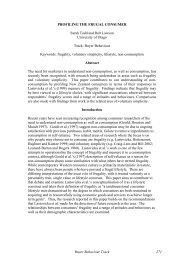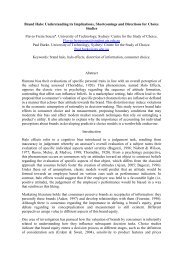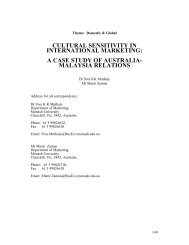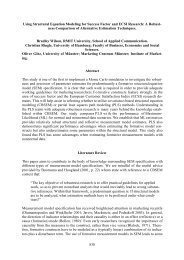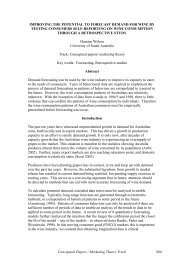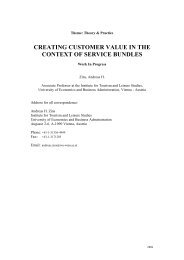amj Australasian Marketing Journal - ANZMAC
amj Australasian Marketing Journal - ANZMAC
amj Australasian Marketing Journal - ANZMAC
Create successful ePaper yourself
Turn your PDF publications into a flip-book with our unique Google optimized e-Paper software.
Book Reviews<br />
Here we do see a lot of familiar material, in the form of portfolio<br />
management and Porter s five-forces etc. Perhaps the<br />
one development in strategy that Doyle has not entirely<br />
embraced is the market maker / rule breaker approach (also<br />
termed strategic innovation - essentially an extension of the<br />
resource-based view of the firm) popularised by Hamel<br />
(2000) and others (e.g. Markides, 1999). The presentation<br />
here is still heavily influenced by the classic industrial organisation<br />
view that industry is the prime determinant of<br />
performance, and that industry structure is a given.<br />
Nonetheless, true to his promise, Doyle extends these frameworks<br />
to incorporate the shareholder value discipline.<br />
Part 3 of the book focuses on implementation, and covers<br />
brand equity, pricing, communications and internet marketing<br />
(but interestingly, there is not a chapter devoted to distribution).<br />
The material in this section will be very useful to practicing<br />
managers in particular, as Doyle provides a set of<br />
methodologies for relating specific marketing (mix) actions to<br />
the value-based metrics. For example, he sets out how<br />
communication programs should, in his view, be justified to<br />
management. He challenges one of the standard methods that<br />
uses incremental sales as a key justification, rightly pointing<br />
out that a great deal of advertising maintains sales levels<br />
rather than increases them, and that to expect short-term<br />
paybacks is often unrealistic. Advertising has longer-term<br />
effects on key intangible assets such as brands and customer<br />
relationships, and therefore these effects should be included in<br />
the business case used to justify expenditure (investment).<br />
That is, we should use the same financial principles to justify<br />
marketing programs as are used to justify building factories or<br />
investing in other tangible assets.<br />
Peter Doyle is not alone in stressing the importance of<br />
marketing accountability, or advocating a closer link between<br />
marketing, finance, and shareholder value (for example, see<br />
Ambler 2000; Srivastava et al., 1998). However, he is the first<br />
to produce a holistic marketing text based around this<br />
84 <strong>Australasian</strong> <strong>Marketing</strong> <strong>Journal</strong> 9 (1), 2001<br />
perspective. As well as an outstanding academic, Doyle is an<br />
active consultant and executive teacher with his finger clearly<br />
on the pulse of marketing practice. The combination of<br />
rigor and relevance to today s business environment makes a<br />
strong combination.<br />
The book would be suitable for three audiences: i) students<br />
taking a core marketing class at a masters level; ii) undergraduate<br />
students studying strategic marketing; and iii) practicing<br />
marketing managers (and therefore executive education<br />
groups). For teachers, if you are looking for something different,<br />
relevant, and more concise than some of the door-stoppers<br />
currently on offer - and you buy into the shareholder<br />
value argument - then have a look through this text. Kotler s<br />
own endorsement on the front cover ( a book destined to<br />
spark a revolution ) suggests we will be reading a great deal<br />
more about value-based marketing in the future.<br />
Chris Styles<br />
University of New South Wales<br />
References<br />
Ambler, Tim. 2000. <strong>Marketing</strong> and the bottom line. London:<br />
Financial Times/Prentice Hall.<br />
Doyle, Peter 1997. <strong>Marketing</strong> Management and Strategy.<br />
Second edition: London: Pearson Education<br />
Hamel, Gary. 2000. Leading the Revolution. Boston: Harvard<br />
Business School Press.<br />
Kotler, Philip. 1999. <strong>Marketing</strong> Management. Tenth edition,<br />
Englewood Cliffs: Prentice Hall.<br />
Markides, Costas. 1999. All the right moves: A guide to crafting<br />
breakthrough strategy. Boston: Harvard Business School Press.<br />
Srivastava Rajendra K., Shervani, Tasadduq, A., Fahey, Liam.<br />
1998. Market-based assets and shareholder value: a framework<br />
for analysis. <strong>Journal</strong> of <strong>Marketing</strong>, 62 (1), 2-19.



